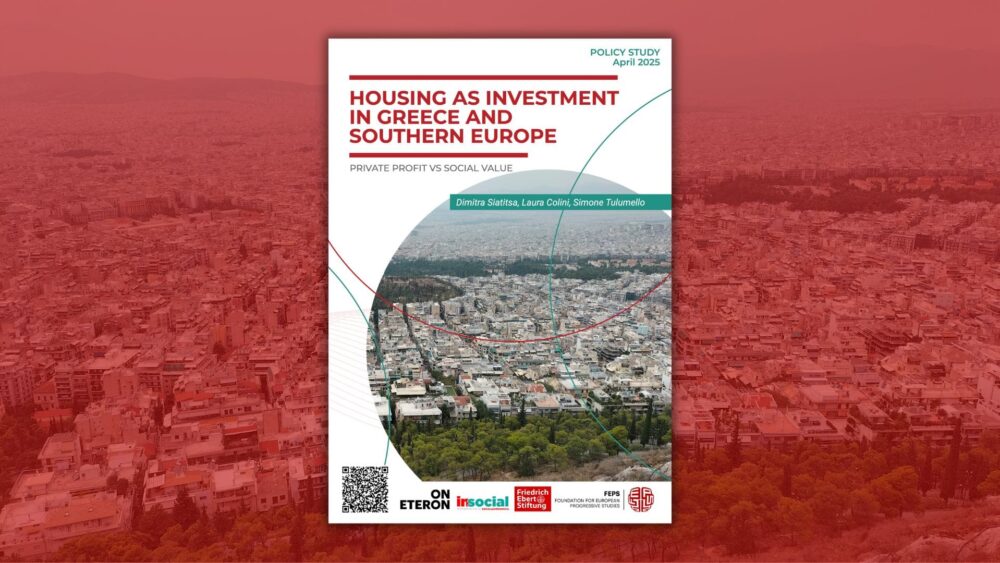
Can there be a fair transition in the housing sector in a country that has no social housing policy?
Project coordinator of “Mind the Roof”, Alkis Kafetzis, discusses the (recently published in Greek by Eteron) FEANTSA study, which evaluates the social impact of renovation and energy upgrade programmes, with Meriç Özgünes and Nikos Vrantsis. The aim of the discussion is to look into the negative social impact of such programmes in Greece, highlight positive examples from abroad and ways in which the current – problematic – situation could be improved.
Interview by Alkis Kafetzis
Edited by Angeliki Κ. Karageorgou
The study by FEANTSA, the European Federation of National Organisations Working with the Homeless, which they co-authored, evaluates renovation and energy upgrade programmes, mainly from a social perspective. In fact, this was the occasion for our discussion with Meriç Özgünes and Nikos Vrantsis, as the study was translated into Greek and published by Eteron as the introductory foundation for the Institute’s new project, “Mind the Roof”.
How do energy upgrade programmes create new trends and exert pressure on the remaining housing stock? Could they be exacerbating rather than mitigating social inequalities regarding housing conditions? These are just two of the several questions that the study attempts to address; a study that provides an important intersection of the individual aspects of the housing inequality issue, due to the many changes brought about by energy upgrade programmes and the existing pressures exerted in the relevant field.
With Thessaloniki as a focal point, Özgünes and Vrantsis’ research interest centres on issues of housing, housing exclusion and energy poverty. Meriç Özgünes works as a Program Manager for Social Inclusion and Inclusion at the Major Development Agency of Thessaloniki (MDAT S.A.), an organisation involved in the design and implementation of the central municipality’s strategy for affordable and social housing. In this capacity, she also participates in the social housing pilot project for the creation of an affordable housing stock. Nikos Vrantsis is a PhD candidate in Human Geography at the Institute for Housing and Urban Research of Uppsala University, and his research concerns changes in spatial political economy in Greek metropolises, using Thessaloniki as a case study.
But let’s start at the beginning. In recent years, soaring energy prices have brought the issue of energy poverty to the forefront. In fact, it has been one of the matters that concern public opinion the most, and that started being the case way earlier than the outbreak of the war between Russia and Ukraine. The roots of energy poverty can be found in the years of the financial crisis. Back then, it manifested itself intensely but in a different form. We were concerned about the smog and the deaths of people in their homes, as they tried to find warmth. Today, the issue of energy poverty is more linked to the increased cost of living and inflation.
So, why is Greek society so vulnerable in the face of this problem? In a country that “enjoys” nine months of summer, why do we struggle so much? “The energy poverty issue doesn’t have the geographical specification that one would expect, as the three countries with the worst rates are in the south of the EU, with Bulgaria, Cyprus, and Greece being at the top of the list”, says Meriç Özgünes. Nikos Vrantsis adds some facts that help complete the picture: “According to research, one in three households have cut back on essential needs, such as buying medication and food, in order to cover energy costs at home. It is a problem that affects the lowest income groups, who, according to other surveys, claim that they are unable to heat their homes or heat only certain areas rather than their entire dwelling”.
This is due to three main factors: the first is linked to the construction quality of houses, the second to the new conditions brought about by the financial crisis, leading large segments of the population to a great inability to meet their daily needs, and the third, to the privatisation of energy production and distribution, which renders it a commodity rather than a public good. Therefore, as Vrantsis points out, “all speculative practices concerning energy mainly affect the lower income strata of society, who need to meet some basic needs, namely to keep warm in the winter and cool in the summer”.
“This isn’t about a mere cost reduction. It’s about a change in people’s quality of life.”
Energy upgrades are the key tool to address these problems in a way that can also contribute to social balancing. But do such upgrades take place in Greece? And if so, how? What has the impact of those efforts been so far?
“There are expectations that investments in energy upgrading of the building stock will help address such issues. However, a significant obstacle that we have identified is that these programmes do not address the potential adverse impact that they may have on society, which is what we tried to examine in our FEANTSA report”, says Özgünes and explains: “Under certain circumstances, if we look at what happens abroad, such investments can have a positive impact on addressing energy poverty. The most radical renovations, that is, when interventions are made at a building level or when they are actually done in-depth, can significantly reduce the energy demand, and cut energy consumption in a building by as much as 90%. Furthermore, research carried out in England shows that such investments also lead to stability in the rental sector, as tenants who benefited from such schemes were able to pay their rent with greater stability.”
It is worth noting that currently, Energy Performance Certificates (EPCs) provide some basic information regarding a building’s energy performance, but not enough about the impact of energy poverty: “We cannot claim we are helping to tackle energy poverty by taking into account just the certificates and the resulting cost reductions. For example, when a family reduces their food consumption to heat their home or only heats the children’s bedroom, upgrading their home by two energy classes may simply result in them being slightly more comfortable, without necessarily being able to stop cutting back on other essential goods. This is all because, quite simply, the energy efficiency features of their home haven’t changed as radically as they’d need them to.”
That is, a proper energy upgrade would allow people who only heat one room in their house or just the living room in which they all gather, to be able to use their entire home or spend more on food and clothing. “This isn’t about a mere cost reduction. It’s about a change in people’s quality of life”, highlights Özgünes.
In Greece there’s no access to social housing
With their study for FEANTSA that was published last October, they sought to investigate whether there is any record of the social impact of energy upgrade programmes. “Unfortunately we found that there was not. There’s nothing other than a technical report that only contains a few bits of information. This is not just a Greek problem, but a concern that exists all across Europe. This is why FEANTSA conducted a whole series of reports, not only for Greece, but also for Hungary and other countries. Because we share the same concerns,” says Özgünes and Vrantsis adds that “The very size of the investment package approved by the EU created this need. It is a frighteningly large amount of money that will be channeled into Greece, through the Recovery Fund, and a huge portion of that funding will be directed to the built environment, for the energy upgrade of dwellings and cities. Therefore, it was necessary to look into the potential social impact that all this money will have on Greek society.”
Meriç Özgünes introduces one more element: “Another concern we had is that such an investment – the green transition of the built environment – will be implemented in a country that has no social housing. In other countries, a large share of this investment is channelled towards existing social housing and so it has a direct impact on improving people’s living conditions. Even in those cases where social housing is managed by the municipality, the state or even non-profit organisations or companies, there are pressures on the rental sector and a thorough impact analysis is needed. Therefore, in a country where there is no access to social housing at all, it is significant to ask ourselves what the impact of all this will be.”
In Thessaloniki, the city used as a case study for the FEANTSA report, there was an average increase in the sale prices of residential property due to renovations by 3-8%, and the respective increase in rents was 3-5%. According to Özgünes, this increase may not seem like much at first glance, but if we consider it in conjunction with the rest of the increasing trends in the real estate market, the poor living conditions and people’s low wages, we can understand that all of these together create a huge pressure.
Can the Renovation Wave be turned into a Renoviction Wave?
“The question and the hypothesis we set out with, is whether what is presented as a renovation wave can turn into a wave of renovictions (renovations+evictions), given all the knowledge we have about the complete lack of any sort of regulatory framework and social criteria. Because of this lack of data, our research was based on some digital platforms and the information that is uploaded there regarding the houses’ condition, e.g. whether they’re renovated or not and the year that the renovation took place.
Using such information,we compared the average cost of renovated and non-renovated homes”, explains Nikos Vrantis and adds: “We found that renovated housing has a higher sales price. The same does not apply as much to rental housing. Renovated and non-renovated flats that are available for rent have more or less the same price. Because of the timing of our research, we made the assumption that this marks a significant shift. It appears that homes are being renovated mainly in order to be sold at higher prices, and not so much to be rented out. An additional assumption is that precisely because there is a sharp and sustained increase in rents, the rise that is due to the renovation of a property that remains in the long-term rental market is outweighed by the more widespread and pronounced increase in the rental market.”
N. Vrantsis also notes that in terms of more qualitative indicators, the report looked at exactly what the Greek state takes into account when it evaluates energy upgrade programmes. “We found that the data they keep is of a superficial and always quantitative nature, without taking into account the rifts we mentioned earlier. Namely, what is happening with the tenants, what is going on with the people who used to live in the house that the owner decided to renovate? Were they able to stay there? Were they asked to pay more rent? Did they suffer an eviction? We don’t have that kind of data and I doubt the state is interested in collecting it, given its clear aim to boost the market”, he says.
The future of the housing issue in Greece
Özgünes is not optimistic about the future of the housing issue in Greece, as she expects that the housing commercialisation trend will be reinforced even further. “At the moment, the prevailing mindset in the market is one that perceives housing as a commodity that can yield a great return, essentially rewarding on very good terms those who were able to invest in housing, treating it mainly as a commodity.” As she points out, this trend is not expected to subside as the government will have an active role in facilitating such practices, sometimes through tax incentives and other times by using its own resources, such as the “My House” programme and the rest of the Housing Act initiatives, such as the social version of flats-for-land (antiparochi).
“So although we don’t need to build, we do. Who builds? The private sector. Who uses it? Once again, the private sector. Are there controlling measures in the social flats-for-land program that stipulate the creation of social housing in return for the provision of public land to a contractor or developer? If so, with what conditions and by which criteria? In this way, the state is directly involved, with its own resources and capabilities, thus reinforcing this specific expectation, which is described with the usual phrasing that involves ‘progress’, ‘development’, etc.” she hastens to add.
Vrantsis adds that for the time being even these interventions, which are supposed to cover the needs of people who are left outside the system, in fact favour the market: “They are formulated and designed with a coating of social sensitivity, but in fact they serve a different purpose”. Vrantsis also argues that at this stage, we need to look at the stakeholders involved in such operations and schemes and see how they are profiting from the use of the built environment (i.e. they keep buildings vacant, put dwellings back on the market with an extremely slow pace or within a controlled setting) whereas the real challenge should be about figuring out a way of using the building stock for more socially oriented purposes.
Programme development in collaboration with social partners
Given that the goal is for everyone to have access to quality and affordable housing, how can the renovation wave contribute to this? According to Özgünes, energy upgrading must be done in a way that its social impact can be monitored effectively. Furthermore, social – and not just technical – partners need to be involved in shaping the relevant programmes, as well as in overseeing them. There should be a transparent evaluation system, not only in terms of technical and energy aspects, but also with regard to the social dimension. There should be follow-ups after the programme has ended, to monitor households in terms of changes in their energy situation and consumption costs. We should also keep looking into the results and impact of energy upgrade investments in the rental sector, even though the proportion of upgraded houses in the rental market is relatively small.
Ban renovictions & guarantee zero or minimal rent increase after energy upgrade investments
According to the FEANTSA report, there is a strong ongoing debate in Europe regarding the social impact. However, in countries such as the Czech Republic and Italy, there are pre-financing provisions and almost 100% of the renovation costs are covered.
“In our research we found that it is difficult for low-income earners to participate in the programme, because they are unable to even cover the initial costs (permits, engineer costs, etc.). So even though the program covers it, one still needs that initial capital”, says Özgünes, adding that another dimension concerns the funding of agencies whose mission is to provide social and affordable housing.
There need to be more favourable conditions on that front or said organisations should be able to apply for money en masse – on behalf of many owners. “There is also a need for rent control, i.e. firstly there should be a temporary ban on renovictions and there should be a rule that after energy upgrade investments, rents cannot increase by more than 2% for two years. In Berlin a five-year rent freeze was announced in 2019. In Canada, permits for renovations are issued on the condition that the properties will stay in long-term leases with a specific, predetermined rent. We will have to see how such measures could be implemented in Greece”, she adds.
Greece: Energy upgrade of residential properties as a way of creating a social housing stock
In Thessaloniki there is the Social Rental Agency that operates within the Major Development Agency of Thessaloniki (MDAT SA.). Its aim, explains Özgünes, is to provide social and affordable housing through the management of public and non-public stock, which has been previously renovated and energetically upgraded. In other words, the Agency will return a part of the stock to society, at reduced rates.
“It is still in its initial phase and we need to see how we can facilitate the operation of similar programmes in Greece. The role of the agency could also be assumed by a non-profit organisation or a cooperative group. It could also be an NGO that undertakes services related to homelessness” she says and points out that in the Social Rental Agency the biggest problem they face is the combination of the social aspect with that of energy. “How do we get access to all this funding, which we cannot use now. We find dwellings, both public and private, but we cannot access energy upgrade funding because we cannot apply for funds en masse, on behalf of others. We need to make the conditions more favourable so that such bodies can play a bigger role. The same kind of facilitation that the public sector gives to private sector actors, should also be given to social economy entities”, she says.
Nikos Vrantsis, on the other hand, focusing more on the construction side, adds that there is a need to control the construction activity as well. “In Greece, we have taken some steps in this direction. One example, which might be small but is still significant, is the Municipality of Patras. In Patras, they have established a market for machinery, where the Municipality’s own workforce has mobilised in order to carry out interventions that are managed by the Municipality itself and are not run in market terms. It has not yet been done in-depth, but we need to look at the capacity of municipalities to intervene in the stock, in a way that allows them to control the prices, interventions, and the resulting quality. Regarding the “Saving” programmes, the focus needs to be on entire buildings rather than on individual apartments, taking into account the different types of households living in a block of flats. There also need to be higher subsidies for the lower income earners, and the possibility of providing full funding in some cases should also be discussed”, he says.
At this point, Meriç Özgünes points out that there are investments and energy upgrade projects and programmes that also include the public stock. “This is an opportunity for Greece to acquire a basic reserve of social housing, since, at the moment, such a thing does not exist in this country. There certainly needs to be some public oversight over these buildings and a share of the public sector property, which will be energetically upgraded, to become part of the country’s social housing stock”, she says.
Another element that complicates the situation in Greece, is the lack of strong will and political fortitude. The state, says Özgünes, runs several projects in cooperation with NGOs, like in Thessaloniki, for instance, where projects concerning homelessness have been carried out in collaboration with such organisations for the last several years.
“Legislation in Greece allows for such programmes to be implemented and for interventions to take place, so ultimately it all comes down to will. Also, the funding happens to be quite flexible. For example, just like it was decided that money from the Recovery Fund would be used for tourism investments, the Government could decide that an X amount of money could be used for social housing, like Portugal did, allocating 2.7 billion for such purposes”, she adds, while Vrantsis notes that in each case of a similar emerging initiative by a municipality, there has previously been some relevant social pressure, which led to steps being taken in this direction.
The municipalities’ role
Therefore, the municipalities’ role emerges as an important one, as they could be the link between movements and state policies. Özgünes, however, points out that this does not mean that in Thessaloniki the Municipality has made housing a priority: “We should not consider it as one solid thing. It’s about individuals, experts, employees, movements, and political interventions that take place in the city council, all heading towards this goal. It’s several separate connections pushing in one direction, and not just one City that is bent on achieving this.”
The pilot project coordinated by Özgünes in Thessaloniki is the social housing project, funded by the Recovery Fund, which includes 30 apartments, while the Fund finances another 70 apartments in Athens. “In Thessaloniki, we believe that it is important to reinforce the managerial side of social housing, so there is an implementing body, called the Social Rental Agency. The apartments that are part of the programme are assigned to the agency, which proceeds with energy upgrades and then manages the flats on behalf of the participating municipalities of Metropolitan Thessaloniki. In Athens, on the other hand, they chose to implement the programme without an intermediary, with direct subsidies to private landlords”, says Özgünes.
The housing issue in and outside Athens
What defines the debate on the housing issue outside of Athens? It all depends on the context, says Vrantsis, explaining that the country’s smaller cities and municipalities are in a constant and steady course of economic and population shrinkage, with young people leaving the countryside to move to larger urban centres or abroad.
“These changes are linked to the country’s broader socio-economic situation, with high unemployment and permanent job insecurity being the norm in the smaller municipalities. This means that in those places too, there is a large share of the housing stock that is vacant. For example, in Naoussa, we found that 1/3 of the city’s building stock is empty.
However, those houses are empty for different reasons. In this case, it is not the result of large-scale investment activities or institutional investors that focused on said municipalities and ended up leading to this big number of vacant buildings. Instead, the vacancy and abandonment is due to migratory outflows.
At the same time, some people are forced to return to their native and/or parental homes. In other words, the shrinkage observed in larger urban centres, such as Thessaloniki, can be associated with the return of certain social groups to their family homes in smaller municipalities. Invisible homelessness also exists in small municipalities with high rates of extreme homelessness. So there is a need for intervention in smaller municipalities as well. It would be crucial to mobilise the respective municipal authority towards managing the housing stock in a way that services the needs of society, thus creating the necessary conditions for the population to remain in these parts of the country” explains Nikos Vrantsis.
Feantsa’s entire study is available in English and in Greek.





